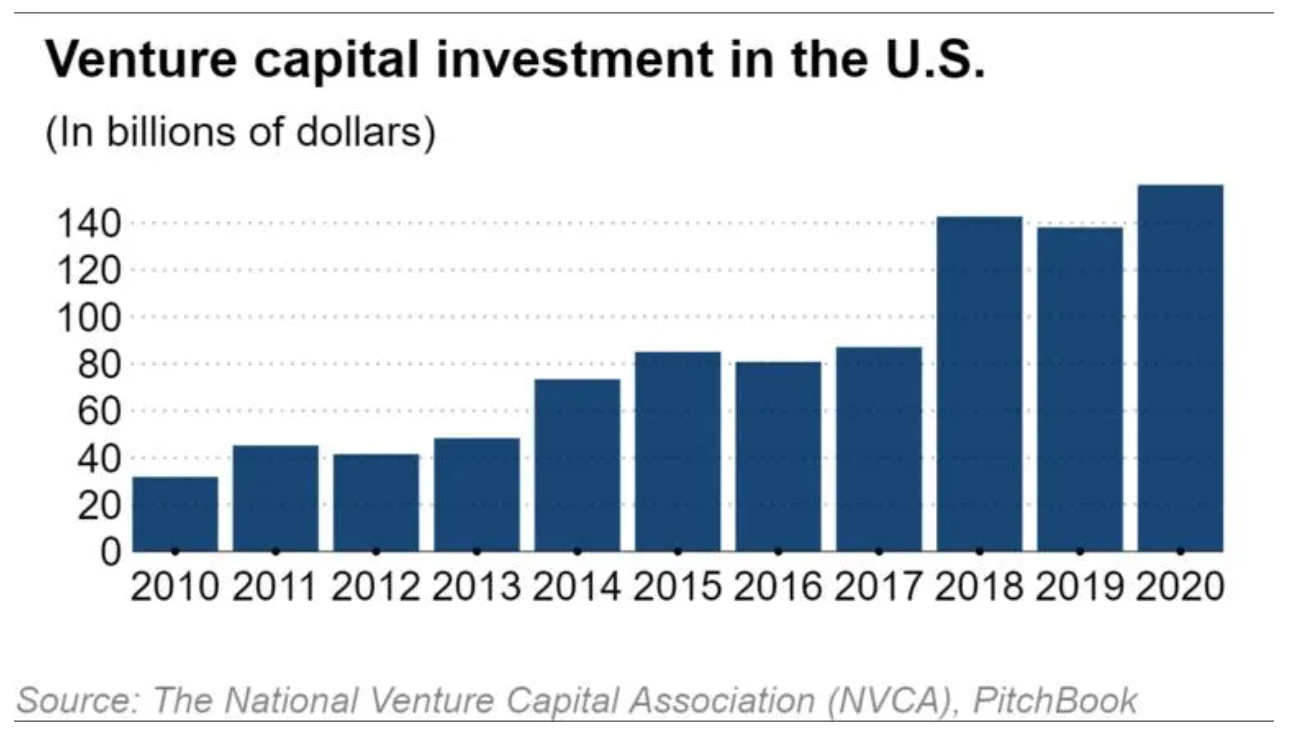Despite the novel coronavirus pandemic, startup investments are booming in the US and China, the world’s two largest economies.
Venture capital investment in the US surged 13% from 2019 to a record annual high of USD 156.2 billion in 2020, led by the health care sector and industries related to software-as-a-service, or SaaS. The previous record of USD 142.7 billion was set in 2018.
The US VC investment figures were compiled by the National Venture Capital Association (NVCA) and US research firm PitchBook.
The US and Chinese VC investment figures in 2020 highlight a growing trend of money flowing into tech companies that are expected to grow, helped by low interest rates, even as the pandemic is still raging around the world.
In the spring of 2020, when the coronavirus outbreak spread around the world, VC investment was believed to have slowed down. Anand Sanwal, CEO of CB Insights in the US, explained that the coronavirus outbreak has underscored the importance of technology.
Amid prolonged low interest rate policies in major countries, financial institutions and investment funds have begun to turn to investment areas other than traditional assets such as stocks and bonds.
As a result, excess liquidity has flowed into the startup market, with companies that are expected to grow amid the coronavirus pandemic attracting badly needed funds.

By industry, US VC investment in biotechnology and pharmaceutical companies jumped 58% to USD 27.4 billion in 2020.
National Resilience, a biopharmaceutical company, raised USD 725 million from investors, including a venture capital company backed by US tech giant Google, in October 2020.
National Resilience will leverage artificial intelligence and other technologies to develop medical products using genes, cells, and proteins.
National Resilience founder Robert Nelsen said the coronavirus outbreak has exposed vulnerabilities in medical supply chains. The company will create a biopharmaceutical product manufacturing process with advanced technologies, he said.
Biotechnology company Moderna, which made its stock market debut in 2018, has become a key coronavirus vaccine developer along with pharmaceutical giants such as Pfizer.
Moderna’s stock price has skyrocketed 6.5-fold in the past year alone. With the threat of the infectious disease continuing, the move to search for the “next Moderna” is spreading.
US VC investment in the business-to-business technology sector, especially in cloud services, hit a new annual high for the third year in a row in 2020, rising 13% to USD 73.7 billion.
Zoom Video Communications, which listed its shares in 2019, has made a leap forward, further encouraging VC investment in the B2B technology sector.
DataRobot, which automates machine learning, procured USD 317 million, while VTEX, which helps companies build online shopping sites, secured USD 225 million.
A tail wind is blowing for such B2B technology companies amid the growing trend of digital transformation due to the pandemic.
Meanwhile, VC investment in the business-to-consumer technology sector, which includes smartphone apps and wearable devices, totaled only USD 43.8 billion in 2020, down 24% from its most recent peak in 2018.
The number of “mega-round” massive investments worth USD 100 million or more is also increasing.
According to CB Insights, the number of mega-rounds spiked 45% from a year earlier to a new annual high of 318 in 2020. The previous high of 220 mega-rounds was registered in 2019.
Security software developer OneTrust raised USD 300 million in December 2020. The company will seek to capitalize on demand for services such as employee privacy protection and sensitive information management, which is growing with the proliferation of teleworking.
In China, capital investments including in startups also swung back into positive territory in 2020, according to data from JingData, a Chinese research company affiliated with 36Kr Holdings. Capital investments soared 40% to RMB 1.21 trillion (USD 187 billion) in the year.
The figures include investments to bail out ailing banks, making a simple comparison with other countries impossible, but growth investments are definitely on the rise in China.
Economic activities resumed early in China after the coronavirus outbreak. The country has also seen the inflow of money into the digitalization of existing industries and the health care sector. XtalPi, which is developing new drugs using AI, successfully raised USD 319 million.
“As for B2C services, US venture capital companies are also investing actively,” said Shunsuke Itadani, an official in charge of investments in China for a fund operated by Tokyo-based PKSHA Technology and others.
Will startup investments around the world, especially in the US and China, continue in 2021 and beyond?
Kuan Hsu of KK Fund, a Singapore-based VC company, said much of the VC money is flowing primarily into sectors such as automation, 5G, and sustainable technologies.
Cameron Dean of Relevance Ventures, a US VC firm, said companies will turn to lower-cost businesses and predicted that the trend of funds being concentrated in services that enhance productivity will grow.
What about Japan?
According to figures compiled by Venture Enterprise Center, a foundation based in Chiyoda Ward, Tokyo, VC investment in Japan between January and September in 2020 amounted to JPY 107.5 billion (USD 1.03 billion), down 33% from the same nine-month period of 2019.
Although VC investment in Japan is currently on a recovery trend, the country still lags far behind the US and China.
This article first appeared on Nikkei Asia. It’s republished here as part of 36Kr’s ongoing partnership with Nikkei.
